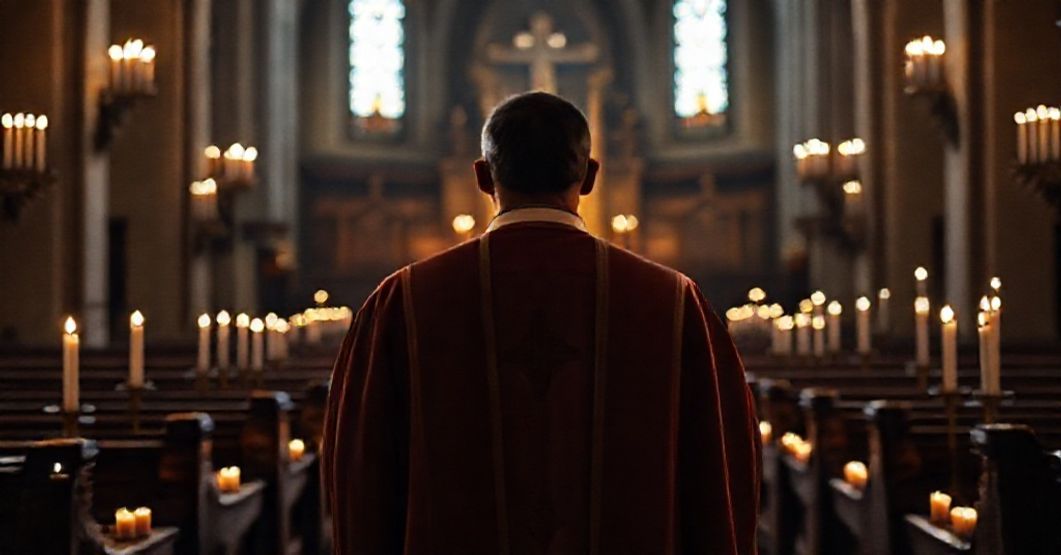Modernist Distortions of Eschatology in Vatican’s All Souls’ Message
Modernist Distortions of Eschatology in Vatican’s All Souls’ Message
Portal Vatican News reports on Angelus remarks attributed to antipope Robert Prevost (“Leo XIV”) regarding the Commemoration of All the Faithful Departed. The article promotes a naturalized eschatology devoid of Catholic substance, omitting Purgatory, the necessity of sacramental grace, and the Church’s exclusive mediatory role.
Naturalization of the Supernatural Order
The usurper’s claim that “the resurrection of the crucified Jesus… sheds light on the destiny of each one of us” constitutes a grave theological reduction. Quas Primas (Pius XI, 1925) teaches Christ’s Kingship requires submission of all intellects to His revealed truths, yet the message reduces resurrection to sentimental optimism: “the focus of God’s concerns [is] that no one should perish forever.” This contradicts the dogmatic teaching that “outside the Church there is no salvation” (Council of Florence, Cantate Domino, 1442), implying universal salvation regardless of one’s relationship to Christ’s Mystical Body.
Worse still, Prevost employs the modernist device of selective quoting from Bergoglio’s predecessor (“Benedict XVI’s Spe Salvi“) to redefine eternal life as “being so immersed in an ocean of infinite love that time… no longer exist[s].” This pantheistic imagery ignores the Syllabus of Errors (Pius IX, 1864) condemnation of those who claim “the Roman Pontiff can… reconcile himself with progress, liberalism and modern civilization” (Error 80).
Erasure of Purgatory and the Church’s Suffrage
Nowhere does the message mention Purgatory, the state of grace, or the necessity of suffrages for departed souls – a stunning omission for a feast centered on prayer for the dead. The Council of Trent (Session XXV) anathematizes those who deny “that the Sacrifice of the Mass is… propitiatory both for the living and the dead.” Yet Prevost reduces Eucharistic commemoration to generic “remembering,” stating vaguely that Christians “remember the deceased in the Eucharist.” This aligns with the modernist error condemned in Lamentabili Sane (1907): “The sacraments merely serve to remind man of the presence of the ever-benevolent Creator” (Proposition 41).
Subjective Memory Replaces Objective Doctrine
The constant emphasis on “memory” as salvific (“Without the memory of Jesus… the immense treasure of daily life risks being forgotten”) reveals the neo-modernist tendency to replace dogma with existential sentiment. Pascendi Dominici Gregis (Pius X, 1907) warned that modernists make religious sentiment the foundation of faith. When Prevost claims “each person is an entire world,” he echoes the conciliar heresy of religious liberty (Dignitatis Humanae), implying each soul’s autonomy from the Church’s judgment.
Abandonment of the Four Last Things
The exhortation to “commemorate… the future” while dismissing “sentimental tears of nostalgia” constitutes a direct attack on Catholic eschatology. Traditional prayers for the dead assume specific realities: Particular Judgment, Purgatorial suffering, the Church’s power to apply Christ’s merits. Prevost’s vision reduces these to a vague “hope that no one will perish” – precisely the indifferentism condemned in Syllabus Errors 16-18. His final quote from the Creed (“I look forward to the resurrection…”) is stripped of its context: the General Judgment where Christ the King will separate elect from reprobate (Matthew 25:31-46).
Ritualism Without Substance
The invitation to cemetery visits as “moments of silence that interrupt the hustle and bustle of life” completes this Gnostic transformation. Catholic tradition requires prayers at gravesites: the De Profundis, Requiem Aeternam, and Rosary for the holy souls. Silence devoid of supplication aligns with the modernist view that “faith… is ultimately based on a sum of probabilities” (Lamentabili, Proposition 25). The article’s closing appeal for donations “to bring the Pope’s words into every home” underscores the mercantile spirit infesting the conciliar sect.
Source::
Pope at Angelus: Remembering the dead brings hope to the future (vaticannews.va)
Article date: 02.11.2025
